Democracy's Red Lines
Adelina Marini, May 25, 2015
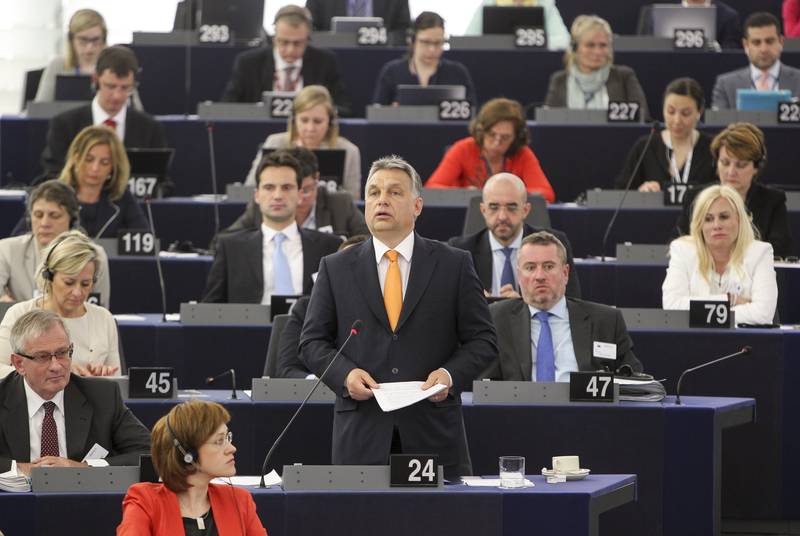 Exactly 10 days after the commemorations of the 70-th anniversary from the victory over Nazism and fascism in the European Parliament there was a debate which showed that nothing was defeated on 9 May 1945 but was just exhausted. During a two-hour long discussion, attended by Hungary Prime Minister Victor Orban, the red lines of democracy and the European civilisation, upgraded upon the ruins from WWII, were several times blurred and even crossed. Instead of answering the many questions the governance of the former fighter for Hungary's freedom from communist totalitarianism Victor Orban raises the debate opened even more questions that cloud the already gloomy commemorations of the Europe Day. A day when we should be grateful to those who gave their lives so that we can debate today and move freely throughout Europe instead of killing each other. It is also a day when we should be sad that somewhere along the way we got lost.
Exactly 10 days after the commemorations of the 70-th anniversary from the victory over Nazism and fascism in the European Parliament there was a debate which showed that nothing was defeated on 9 May 1945 but was just exhausted. During a two-hour long discussion, attended by Hungary Prime Minister Victor Orban, the red lines of democracy and the European civilisation, upgraded upon the ruins from WWII, were several times blurred and even crossed. Instead of answering the many questions the governance of the former fighter for Hungary's freedom from communist totalitarianism Victor Orban raises the debate opened even more questions that cloud the already gloomy commemorations of the Europe Day. A day when we should be grateful to those who gave their lives so that we can debate today and move freely throughout Europe instead of killing each other. It is also a day when we should be sad that somewhere along the way we got lost.
A clash of values
The debate on Hungary was being planned for a long time because of the many signals that there a fast process of distancing from the European system of values is taking place and a turn toward the neo-Russian totalitarian system can be observed. The big European political parties, however, refused the debate last autumn. It is a real success of the European Parliament that it finally managed to hold such a debate, moreover in the presence of Prime Minster Orban. Alas, the discussion touched upon only two issues, the most recent ones in the EU-Hungary relations - the discussion on reintroduction of the capital punishment and the very manipulative questionnaire with which the Hungarian government launched a public consultation on the problems with migration. This finally provoked the European institutions to react really sharply, led by the European Parliament. There was a meeting of the conference of presidents, President Martin Schulz spoke with Mr Orban on the phone, the Commission too held consultations with the Hungarian premier.
And while it is really commanding that the Parliament has finally managed to organise this long-awaited debate and that the Hungarian prime minister agreed to attend, the debate revealed that the dividing line of values goes beyond Hungary. Moreover, it showed that the EU is practically powerless to handle such a problem. On the one hand, the Council as an institution representing all the 28 member states refused to take a side on the issues raised and on the other hand political groups and individual members made odd statements. The prime minister of Hungary himself also took part in the debate with a provocative statement full with contradictions. In other words, the debate was a real clash of values which just confirms the doubts of many in the EU that the lessons from the past have not been learnt by everyone.
Why these issues are EU's greatest problems?
As Commission First Vice President Frans Timmermans told the MEPs, the reintroduction of the death penalty is completely against the European values. If that happened, the Commission would immediately trigger the EU "nuclear option", i.e. Article 7 of the Treaty of the EU which deprives a member state of voting powers in the Council. However, he said that the Commission had received assurances by the Hungarian government that it did not intend to reinstall the capital punishment. The second issue is currently a hot potato in the EU - the fight against the wave of illegal immigration. The Commission and Parliament find it worrying that the Hungarian government has put misleading questions in the questionnaire on immigration. According to Mr Timmermans, there is no problem with the public consultations in general but with misleading questions, with imposition of prejudices and with putting immigration in the context of terrorism.
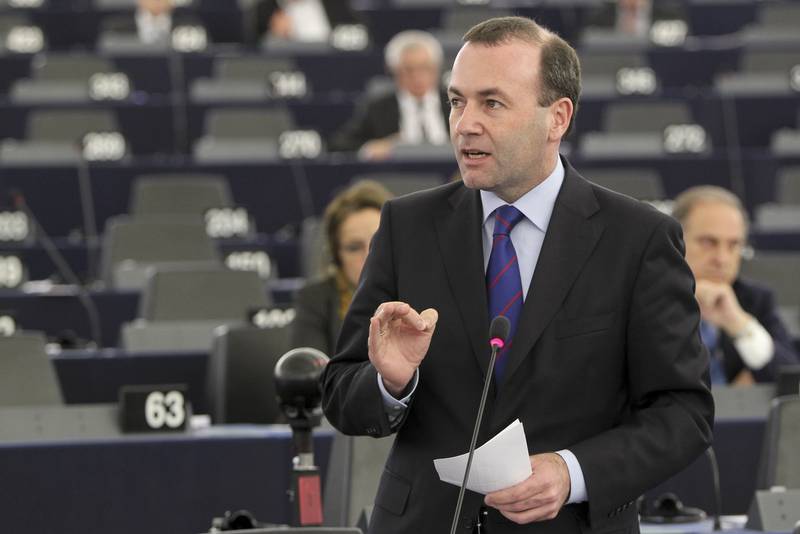 The questions can be found on the webpage of the Hungarian government in English. They are 12. Reading them leaves no doubt that, indeed, this is about misleading and manipulation. An example of a misleading question is, for instance: "There are some who think that mismanagement of the immigration question by Brussels may have something to do with increased terrorism. Do you agree with this view?". The next question also causes perplexity regarding the purpose of the consultation: "Did you know that economic migrants cross the Hungarian border illegally, and that recently the number of immigrants in Hungary has increased twentyfold?". Then follow questions which are undoubtedly manipulative: "There are some who believe that Brussels’ policy on immigration and terrorism has failed, and that we therefore need a new approach to these questions. Do you agree?" and "Would you support the Hungarian Government in the introduction of more stringent immigration regulations, in contrast to Brussels’ lenient policy?".
The questions can be found on the webpage of the Hungarian government in English. They are 12. Reading them leaves no doubt that, indeed, this is about misleading and manipulation. An example of a misleading question is, for instance: "There are some who think that mismanagement of the immigration question by Brussels may have something to do with increased terrorism. Do you agree with this view?". The next question also causes perplexity regarding the purpose of the consultation: "Did you know that economic migrants cross the Hungarian border illegally, and that recently the number of immigrants in Hungary has increased twentyfold?". Then follow questions which are undoubtedly manipulative: "There are some who believe that Brussels’ policy on immigration and terrorism has failed, and that we therefore need a new approach to these questions. Do you agree?" and "Would you support the Hungarian Government in the introduction of more stringent immigration regulations, in contrast to Brussels’ lenient policy?".
The European Commission is especially sensitive on the issue of migration since it presented on 13 May (earlier than planned) the European agenda on migration which contains some ideas that have already met strong resistance in some member states led by UK, Hungary and France. Frans Timmermans said in Strasbourg last week that it was wrong migrants to be presented as a threat for jobs and for people's lives. This does not mean to close our eyes for the problems migration creates but this should not be for the sake of the Union's fundamental values. "We need political leaders who are willing to explain EU policy to their citizens in an open, fair and balanced manner, and who stand firm for joint and common European values. This is the only way we can make progress together in Europe", said Mr Timmermans (The Netherlands, ALDE).
Victor Orban made his statement in the middle of the debate starting by outlining Hungary's economic successes. Hungary was before 21st in terms of GDP growth out of 28 member states and now it is second. The public debt is reduced to 75% of GDP, unemployment is reduced from 11 per cent to 7 per cent. Then he explained that the Hungarians are generally open people who do not like to waffle. "We like to talk straight, or not at all", he said because, according to him, political correctness has never brought a solution to any problem. Straightforwardly (in the Hungarian way) he said that the Hungarians wanted Europe to be a continent of the Europeans and Hungary to belong to the Hungarians. Something which is quite contradictory. He believes the European agenda on migration borders with madness. Added that the Hungarian government was a Christian one which is why it would accept the "genuine migrants" but recalled that illegal border crossing was a crime.
During his 10-minute long speech he recalled that in no EU treaty it was said what could be subjected to public consultation and what not. "Therefore, we see it as a violation of the core treaty of the European Union for anyone to try to tell us what we Hungarians may or may not voice our views about". We should not bury our heads in the sand. We are talking about freedom of thought and freedom of expression. We should talk about the death penalty, he continued, but any changes should be in line with the Constitutional requirements - both Hungarian and of the EU. A minute later he added, however, that those rules were not set in stone. "[...] they were created by human beings, and people may therefore change them at any time. This is freedom, and this is democracy". After finishing his statement 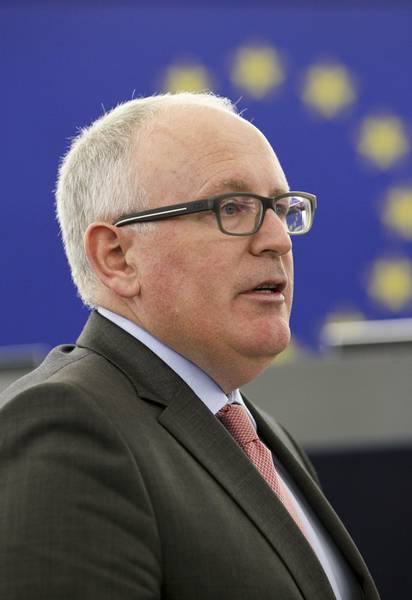 President Martin Schulz remarked that, indeed, no God commandment was part of the EU treaties, "I know one commandment, though, which says 'Don't kill!'".
President Martin Schulz remarked that, indeed, no God commandment was part of the EU treaties, "I know one commandment, though, which says 'Don't kill!'".
While speaking Orban was causing mixed reactions in the house. Here and there could be heard applauses, Frans Timmermans's face turned red and the liberal and left MEPs were shaking their heads in denial and perplexity with what they heard. What was most surprising, however, was that reactions split along party lines. The leader of the biggest political fraction in the European Parliament - EPP - Manfred Weber (Germany), started precisely with saying that last year the EPP wanted a debate on the "scandalous events in Romania" when hundreds of thousands of people were unable to vote in the presidential elections but then the left part of the house refused.
He recalled that the situation in Hungary was discussed five times in the European Parliament. "This means it is us in the EPP that are ready to discuss whereas the left part of the house obviously has no eyes for many things in Europe". He also pointed out Hungary's economic successes underscoring that Victor Orban was re-elected. 51% trusted his party Fidesz again, the German MEP reminded. "Obviously this is not to the liking of the left wing". On the occasion of the death penalty Mr Weber said, though, that this was the same civilisational achievement as democracy. "That is why, we believe that a debate on death penalty is harmful for us as EU because no one talks about this".
Gianni Pittella, the leader of the second largest political group (Socialists and Democrats, Italy), was unhappy with the attempt the issue to be put in the framework of inter-party bickering, saying that it was not about whether someone liked Victor Orban or not and which political family he belonged to. Some of his statements simply go too far, he said. Indignant were also those who spoke from the Liberal group, the group of Greens/European Free Alliance and the far left. The other right-wing parties, however, were even more extreme than the EPP. Timothy Kirkhope from the European Conservatives and Reformists group (UK) asked when the European Parliament had turned into a judge and executioner of people with different views. He meant the attendance of Victor Oran in the debate in Strasbourg. The member states have the right to discuss certain topics, "which are not included in the pre-approved list of topics", he said.
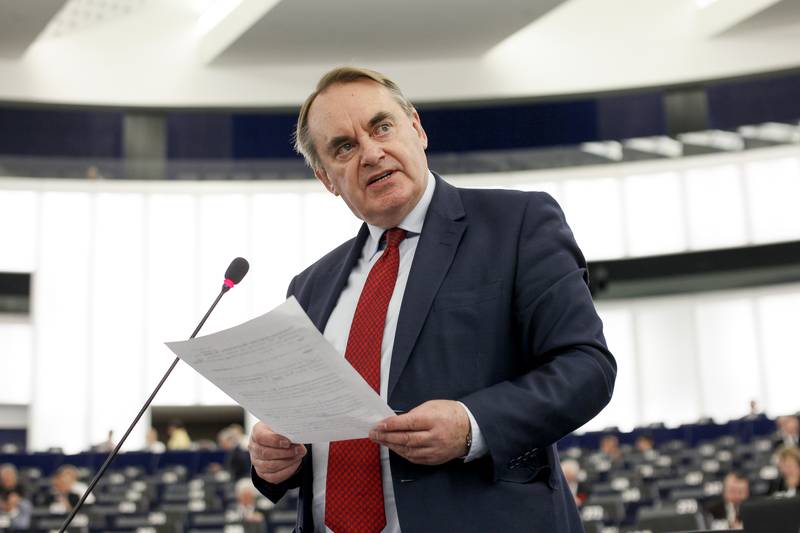 Timothy Kirkhope was undersecretary for migration and border control in the British Home Office. His statement confirmed the thesis of Jose Manuel Barroso, the former European Commission chief, that very soon the ideological lines between the ECR group and Nigel Farage's group would merge.
Timothy Kirkhope was undersecretary for migration and border control in the British Home Office. His statement confirmed the thesis of Jose Manuel Barroso, the former European Commission chief, that very soon the ideological lines between the ECR group and Nigel Farage's group would merge.
Does democracy have boundaries?
The two-hour long debate focused mainly on the issue of migration and served as a warming up for the debate on the European agenda for migration on the next day, again, with France Timmermans and EU Migration Commissioner Dimitris Avramopoulos. It was mainly the leaders of political groups who tried to put the issue back to Hungary. According to Liberal leader Guy Verhofstadt, Orban's words should be taken very seriously because some of them were very problematic. He called for an end to debates and move on to specific actions on behalf of the Commission. This enraged Mr Kirkhope who said that such a debate should have never taken place. Gianni Pittella added that everything was about democracy itself. A topic which raises several important issues which, following Hungary's example, should be subjected to a common European consultation, if possible without manipulative questions. Here are some of these issues:
- Is hate speech, xenophobia or extremism freedom of speech?
- Is it a democracy the return of authoritarianism through stifling freedom of speech and through manipulation?
- Is it being "a judge or executioner" to invite a prime minister of a member state to attend a debate on his country in the European Parliament and to give him/her the possibility to express his/her position?
Some of these questions were answered by France Timmermans last Wednesday and to others he answered earlier. In the end of the debate he said that the economic and electoral success could not be for the sake of rule of law in the EU. According to him, freedom of speech is limited by the rule of law. In February, when the European Parliament debated on the common European rule of law mechanism, he said that there was no such animal as illiberal democracy.
The conclusions from the debate are many and are not nice. One of the most important one is that in some parts of Europe the European values, as articulated in Article 2 of the Treaty of the EU, are being perceived in a twisted and speculative way. Another very unpleasant conclusion is that the European political parties instead of being champions of these values have turned into champions of their majorities, as euinside wrote. A third conclusion is related to the British issue. The rupture between the ruling Conservatives in Britain and the EU is now a fact. The statements of British right-wing MEPs leave no doubt that there is anything left, apart from trade, that connects the continent with the island. The MEPs often twist facts to send sharp criticism against the EU which often border with institutional hate speech. An example of such a statement is Timothy Kirkhope's last Wednesday.
One of the European Parliament's greatest achievements in the last term was the hearing of many premiers and presidents in the plenary. This tradition must be continued because it provides a wonderful opportunity to measure the temperature in the various parts of the Union. This is particularly useful both for the supranational debate and for the national agendas. Martin Schulz has great merit for these dialogues and should not give up on them. Moreover, he should insist on the hearing of the new but also of the well known heads of state or government in Strasbourg or Brussels. A good beginning could be to invite David Cameron who is currently working hard to fulfil his pre-election pledges. Although he does not recognise the European Parliament as an institution, the last year's European elections should have proved to him that it is a mistake to underestimate the European Parliament. From the rostrum in 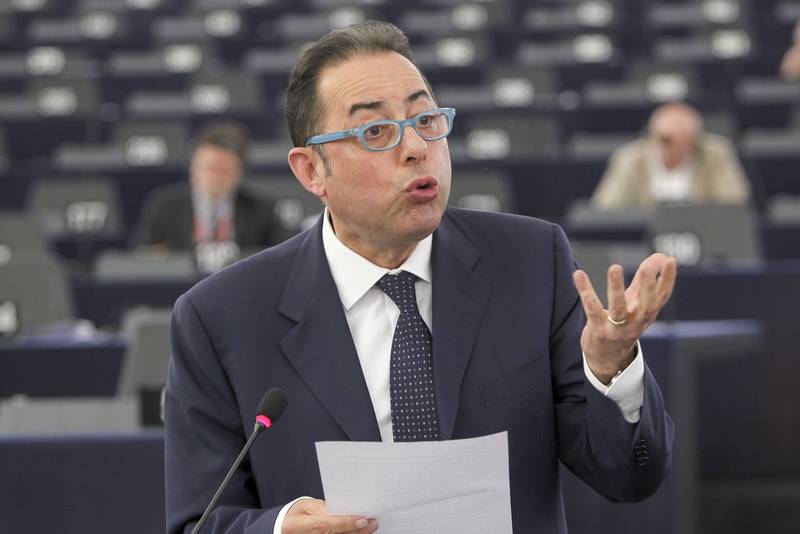 Strasbourg he would have the possibility to address not just the leaders of the member states but their citizens as well.
Strasbourg he would have the possibility to address not just the leaders of the member states but their citizens as well.
In parallel, the European Parliament should hold a series of debates on the way the European values are being perceived in the member states. This is much more important than it seems because these values are the very tissue of the EU. Their lack could be the failure of the European project and not respecting them is a bad signal for all those around the EU that see the Union as attractive precisely because of its system of values. Therefore, it would be wonderful to organise debates in the plenary on the situations in Bulgaria and Romania which are a subject of special mechanism by inviting their prime ministers to attend too. The political groups in the European Parliament should stop their resistance against this because it is not to their benefit. Individual leaders should not represent the whole party or its political ideology. This is deeply wrong. EU values should cost more than seats in the European Parliament which already cost dearly to the European taxpayer against the backdrop of the growingly questionable benefit for the European project.
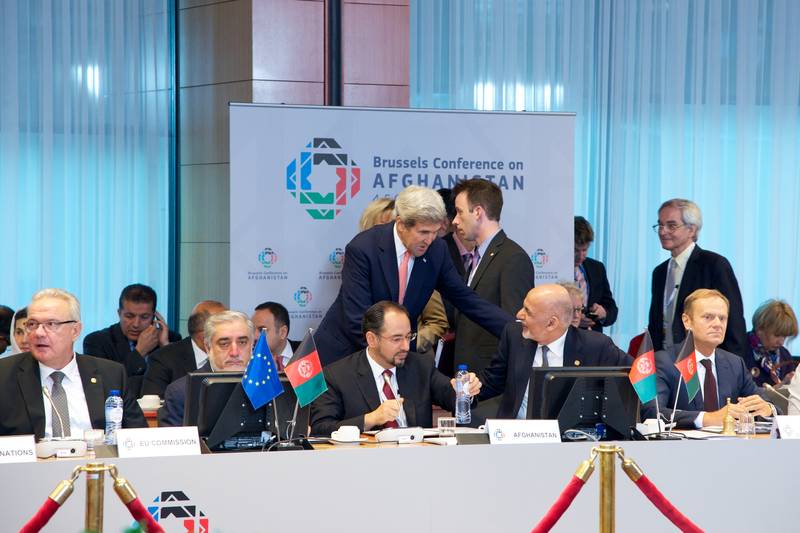 | © Council of the EU
| © Council of the EU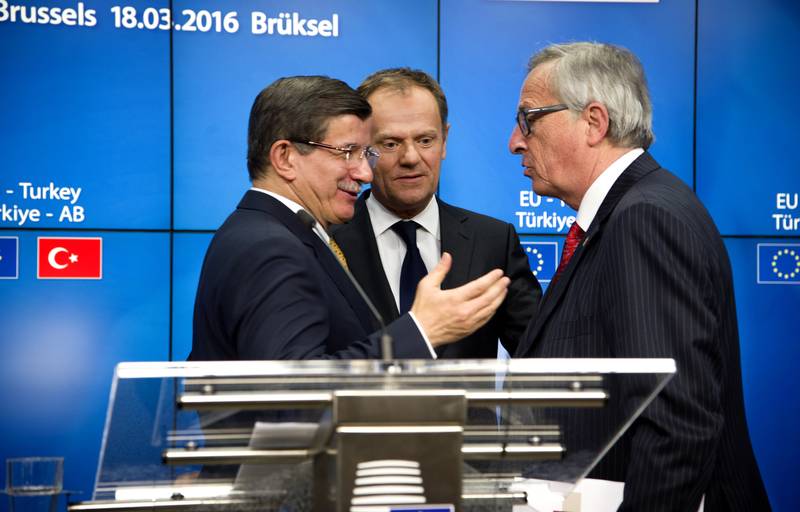 Davutoglu, Tusk, Juncker | © Council of the EU
Davutoglu, Tusk, Juncker | © Council of the EU Entrance to the Berlaymont building | © EC - Audiovisual Service
Entrance to the Berlaymont building | © EC - Audiovisual Service | © European Union 2020, EC - Audiovisual Service
| © European Union 2020, EC - Audiovisual Service Commission President Ursula von der Leyen | © European Union 2019 - Source: EP
Commission President Ursula von der Leyen | © European Union 2019 - Source: EP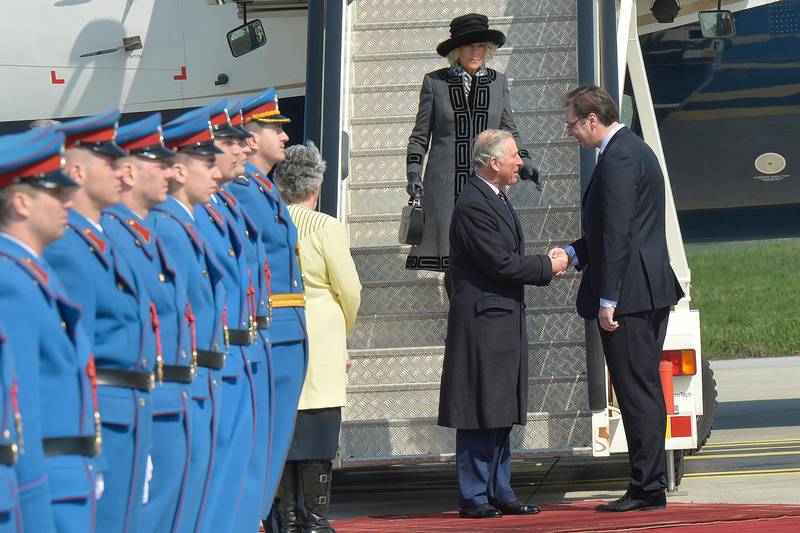 | © Vlada RS
| © Vlada RS